- Home
- Robert Harris
Enigma Page 7
Enigma Read online
Page 7
It was the practice on the night shift at about four o’clock in the morning for everyone to take a meal-break. The cryptanalysts went off when they liked, depending on the stage they’d reached in their work. The Decoding Room girls and the clerks in the Registration and Catalogue rooms had to leave according to a rota so that the hut was never caught short-staffed.
Jericho didn’t notice the drift of people towards the door. He had both elbows on the table and was leaning over the cryptograms, his knuckles pressed to his temples. His mind was eidetic – that is to say, it could hold and retrieve images with photographic accuracy, be they mid-game positions in chess, crossword puzzles or enciphered German naval signals – and he was working with his eyes closed.
‘“Below the thunders of the upper deep,”’ intoned a muffled voice behind him, ‘“Far, far beneath in the abysmal sea,/His ancient, dreamless, uninvaded sleep …”’
‘“… The Kraken sleepeth.”’ Jericho finished the quotation and turned to find Atwood pulling on a purple balaclava. ‘Coleridge?’
‘Coleridge?’ Atwood’s face abruptly emerged wearing an expression of outrage. ‘Coleridge? It’s Tennyson, you barbarian. We wondered whether you’d care to join us for refreshment.’
Jericho was about to refuse, but decided that would be rude. In any case, he was hungry. He’d eaten nothing except toast and jam for twelve hours.
‘That’s kind. Thank you.’
He followed Atwood, Pinker and a couple of the others along the length of the hut and out into the night. At some stage while he’d been lost in the cryptograms it must have rained and the air was still moist. Along the road to the right he could hear people moving in the shadows. The beams of torches glistened on the wet tarmac. Atwood conducted them past the mansion and the arboretum and through the main gate. Discussing work outside the hut was forbidden and Atwood, purely to annoy Pinker, was declaiming on the suicide of Virginia Woolf, which he held to be the greatest day for English letters since the invention of the printing press.
‘I c-c-can’t believe you mmm-mmm-mmm …’ When Pinker snagged himself on a word, his whole body seemed to shake with the effort of trying to get himself free. Above his bow-tie, his face bloomed scarlet in the torchlight. They stopped and waited patiently for him. ‘Mmm-mmm …’
‘Mean that?’ suggested Atwood.
‘Mean that, Frank,’ gasped Pinker with relief. ‘Thank you.’
Someone came to Atwood’s support, and then Pinker’s shrill voice started to argue again. They moved off. Jericho lagged behind.
The canteen, which lay just behind the perimeter fence, was as big as an aircraft hangar, brightly lit and thunderously noisy, with perhaps five or six hundred people sitting down to eat or queuing for food.
One of the new cryptanalysts shouted to Jericho: ‘I bet you’ve missed this!’ Jericho smiled and was about to say something in return but the young man went off to collect a tray. The din was dreadful, and so was the smell – a blended steam of institutional food, of cabbage and boiled fish and custard, laced with cigarette smoke and damp clothes. Jericho felt simultaneously intimidated by it and detached from it, like a prisoner returning from solitary confinement, or a patient from an isolation ward released on to the street after a long illness.
He queued and didn’t pay much attention to the food being slopped on his plate. It was only after he had handed over his two shillings and sat down that he took a good look at it – boiled potatoes in a curdled yellow grease and a slab of something ribbed and grey. He stabbed at the lump with his fork, then lifted a fragment cautiously to his mouth. It tasted like fishy liver, like congealed cod liver oil. He winced.
‘This is perfectly vile.’
Atwood said, through a full mouth: ‘It’s whale meat.’
‘Good heavens.’ Jericho put his fork down hurriedly.
‘Don’t waste it, dear boy. Don’t you know there’s a war on? Pass it over.’
Jericho pushed the plate across the table and tried to swill the taste away with the milk-water coffee.
The pudding was some kind of fruit tart, and that was better, or, rather, it tasted of nothing more noxious than cardboard, but halfway through it, Jericho’s wavering appetite finally died. Atwood was now giving them his opinion of Gielgud’s interpretation of Hamlet, spraying the table in the process with particles of whale, and at that point Jericho decided he’d had enough. He took the leftovers that Atwood didn’t want and scraped them into a milk churn labelled ‘PIG SWILL’.
When he was halfway to the door he was suddenly overcome with remorse at his rudeness. Was this the behaviour of a good colleague, what Skynner would call ‘a team player’? But then, when he turned and looked back, he saw that nobody had missed him. Atwood was still talking, waving his fork in mid-air, Pinker was shaking his head, the others were listening. Jericho turned once more for the door and the salvation of the fresh air.
Thirty seconds later he was out on the pavement, picking his way carefully in the darkness towards the guard post, thinking about Shark.
He could hear the click click of a woman’s heels hurrying about twenty paces in front of him. There was no one else around. It was between sittings: everyone was either working or eating. The rapid footsteps stopped at the barrier and a moment later the sentry shone his torch directly in the woman’s face. She glanced away with a murmur of annoyance, and Jericho saw her then, for an instant, spot-lit in the blackout, looking straight in his direction.
It was Claire.
For a fraction of a second, he thought she must have seen him. But he was in the shadows and reeling backwards in panic, four or five steps backwards, and she was dazzled by the light. With what seemed like infinite slowness she brought her hand up to shield her eyes. Her blonde hair gleamed white.
He couldn’t hear what was said but very quickly the torch was quenched and everything was dark again. And then he heard her moving off down the path on the other side of the barrier, click click click, obviously in a rush about something, fading into the night.
He had to catch her up. He stumbled quickly to the guard post, searching for his wallet, searching for his pass, nearly tripping off the kerbstone, but he couldn’t find the damned thing. The torch came on, blinding him – ‘evening sir’, ‘evening corporal’ – and his fingers were useless, he couldn’t make them work, and the pass wasn’t in his wallet, wasn’t in his overcoat pockets, wasn’t in his jacket pockets, breast pocket – he couldn’t hear her footsteps now, just the sentry’s boot tapping impatiently – and, yes, it was in his breast pocket, ‘here you are’, ‘thank you sir’, ‘thank you corporal’, ‘night sir’, ‘night corporal’, night, night, night …
She was gone.
The sentry’s light had robbed him of what little vision he had. When he closed his eyes there was only the imprint of the torch and when he opened them the darkness was absolute. He found the edge of the road with his foot and followed its curve. It took him once again past the mansion and brought him out close to the huts. Far away, on the opposite bank of the lake, someone – perhaps another sentry – started to whistle ‘We’ll Gather Lilacs in the Spring Again’, then stopped.
It was so quiet, he could hear the wind moving in the trees.
While he was hesitating, wondering what to do, a dot of light appeared along the footpath to his right, and then another. For some reason Jericho drew back into the shadows of Hut 8 as the torches bobbed towards him. He heard voices he didn’t recognise – a man’s and a woman’s – whispered but emphatic. When they were almost level with him, the man threw his cigarette into the water. A cascade of red points ended in a hiss. The woman said: ‘It’s just a week, darling,’ and went to embrace him. The fireflies danced and separated and moved on.
He stepped out onto the path again. His night vision was coming back. He looked at his watch. It was 4.30. Another ninety minutes and it would start to get light.
On impulse he walked down the side of Hut 8, keeping close to the blastp
roof wall. This brought him to the edge of Hut 6, where the ciphers of the German Army and Luftwaffe were broken. Straight ahead was a narrow alleyway of rough grass separating Hut 6 from the end wall of the Naval Section. And at the end of that, crouched low in the darkness, just about visible, was the side of another hut – Hut 3 – to which the decrypted ciphers from Hut 6 were sent for translation and dispatch.
Hut 3 was where Claire worked.
He glanced around. There was no one in sight.
He left the path and started to stumble down the passage. The ground was slippery and uneven and several times something grabbed at his ankle – ivy, maybe, or a tendril of discarded cable – and almost sent him sprawling. It took him about a minute to reach Hut 3.
Here, too, was a concrete wall, designed, optimistically, to shield the flimsy wooden structure from an exploding bomb. It was neck-high, but although he was short he was just about able to peer over the top.
A row of windows was set into the side of the building. Over these, from the outside, blackout shutters were fastened every day at dusk. All that was visible was the ghosts of squares, where the light seeped around the edges of the frames. The floor of Hut 3, like Hut 8’s, was made of wood, suspended above a concrete base, and he could hear the muffled clumps and thuds of people moving about.
She must be on duty. She must be working the midnight shift. She might be three feet from where he stood.
He was on tiptoe.
He had never been inside Hut 3. For reasons of security, workers in one section of the Park were not encouraged to stray into another, not unless they had good reason. From time to time his work had taken him over the threshold of Hut 6, but Hut 3 was a mystery to him. He had no idea of what she did. She’d tried to tell him once, but he’d said gently that it was best he didn’t know. From odd remarks he gathered it was something to do with filing and was ‘deadly dull, darling’.
He stretched out as far as he could, until his fingertips were brushing the asbestos cladding of the hut.
What are you doing, darling Claire? Are you busy with your boring filing, or are you flirting with one of the night-duty officers, or gossiping with the other girls, or puzzling over that crossword you can never do?
Suddenly, about fifteen yards to his left, a door opened. From the oblong of dim light a uniformed man emerged, yawning. Jericho slid silently to the ground until he was kneeling in the wet earth and pressed his chest against the wall. The door closed and the man began to walk towards him. He stopped about ten feet away, breathing hard. He seemed to be listening. Jericho closed his eyes and shortly afterwards he heard a pattering and then a drilling noise and when he opened them he saw the faint silhouette of the man pissing against the wall, very hard. It went on for a wondrously long time and Jericho was close enough to get a whiff of pungent, beery urine. A fine spray was being borne downwind on the breeze. He had to put his hand to his nose and mouth to stop himself gagging. Eventually, the man gave a deep sigh – a groan, almost – of satisfaction, and fumbled with the buttons of his fly. He moved away. The door opened and closed again and Jericho was alone.
There was a certain humour in the situation, and later even he was to see it. But at the time he was on the edge of panic. What, in the name of reason, did he think he was doing? If he were to be caught, kneeling in the darkness, with his ear pressed to a hut in which he had no business, he would have – to put it mildly – a hard time explaining himself. For a moment he considered simply marching inside and demanding to see her. But his imagination recoiled at the prospect. He might be thrown out. Or she might appear in fury and create a scene. Or she might appear and be the soul of sweetness, in which case what did he say? ‘Oh, hello, darling. I just happened to be passing. You look in good form. By the way, I’ve been meaning to ask you, why did you wreck my life?’
He used the wall to help him scramble to his feet. The quickest way back to the road was straight head, but that would take him past the door of the hut. He decided that the safest course would be to go back the way he had come.
He was more cautious after his scare. Each time he took a step he planted his foot carefully and on every fifth pace he paused to make sure that no one else was moving around in the blackout. Two minutes later he was back outside the entrance to Hut 8.
He felt as if he had been on a cross-country run. He was out of breath. There was a small hole in his left shoe and his sock was wet. Bits of damp grass were sticking to the bottoms of his trouser legs. His knees were sodden. And where he had rubbed against the concrete wall the front of his overcoat was streaked luminously white. He took out his handkerchief and tried to clean himself up.
He had just about finished when he heard the others coming back from the canteen. Atwood’s voice carried in the night: ‘A dark horse, that one. Very dark. I recruited him, you know,’ to which someone else chimed in: ‘Yes, but he was once very good, wasn’t he?’
Jericho didn’t stop to hear the rest. He pushed open the door and almost ran down the passage, so that by the time the cryptanalysts appeared in the Big Room he was already seated at his desk, bent over the intercepts, knuckles to his temples, eyes closed.
He stayed like that for three hours.
At about six o’clock, Puck stopped by to drop on the table another forty encrypted signals, the latest batch of Shark traffic, and to enquire – not without a degree of sarcasm – if Jericho had ‘solved it yet?’ At seven, there was a rattle of step ladders against the outside wall and the blackout shutters were unfastened. A pale grey light filtered into the hut.
What was she doing, hurrying into the Park at that time of night? That was what he did not understand. Of course, the mere fact of seeing her again after a month spent trying to forget her was disturbing. But it was the circumstances, in retrospect, that troubled him more. She had not been in the canteen, he was sure of that. He had scrutinised every table, every face – had been so distracted he had barely even looked at what he was being given to eat. But if she had not been in the canteen, where had she been? Had she been with someone? Who? Who? And the way she was walking so hurriedly. Was there not something furtive, even panicky, about it?
His memory replayed the scene frame by frame: the footsteps, the flash of light, the turn of her head, her cry, the halo of her hair, the way she had vanished … That was something else. Could she really have walked the entire distance to the hut in the time it took him to fumble for his pass?
Just before eight o’clock he gathered the cryptograms together and slipped them into the folder. All around him, the cryptanalysts were preparing to go off shift – stretching and yawning and rubbing at tired eyes, pulling together their work, briefing their replacements. Nobody noticed Jericho walk quickly down the corridor to Logie’s office. He knocked once. There was no reply. He tried the door. As he remembered: unlocked.
He closed it behind him and picked up the telephone. If he delayed for a second his nerve would fail him. He dialled ‘0’ and on the seventh ring, just as he was about to give up, a sleepy operator answered.
His mouth was almost too dry to get the words out. ‘Duty Officer, Hut 3, please.’
Almost immediately a man’s voice said, irritably: ‘Colonel Coker.’
Jericho nearly dropped the receiver.
‘Do you have a Miss Romilly there?’ He didn’t need to disguise his voice: it was so strained and quavering it was unrecognisable. ‘A Miss Claire Romilly?’
‘You’ve come through to completely the wrong office. Who is this?’
‘Welfare.’
‘Oh bloody hell!’ There was a deafening bang, as if the colonel had thrown the telephone across the room, but the connection held. Jericho could hear the clatter of a teleprinter and a man’s voice, very cultured, somewhere in the background: ‘Yes, yes, I’ve got that. Right-oh. Cheerio.’ The man ended one conversation and started another. ‘Army Index here …’ Jericho glanced at the clock above the window. Now it was past eight. Come on, come on … Suddenly there was m
ore loud banging, much closer, and a woman said softly in Jericho’s ear: ‘Yes?’
He tried to sound casual but it came out as a croak. ‘Claire?’
‘No, I’m afraid it’s Claire’s day off. She won’t be back on duty until eight tomorrow morning. Can I help?’
Jericho gently replaced the receiver in its cradle, just as the door was thrown open behind him.
‘Oh, there you are, old thing …’
4
Daylight Diminished the huts.
The blackout had touched them with a certain mystery but the morning showed them up for what they were: squat and ugly, with brown walls and tarred roofs and a premature air of dereliction. Above the mansion, the sky was glossy white with streaks of grey, a dome of polished marble. A duck in drab winter plumage waddled across the path from the lake looking for food, and Logie almost kicked it as he strode past, sending it protesting back to the water.
He had not been in the least perturbed to find Jericho in his office and Jericho’s carefully prepared excuse – that he was returning the Shark intercepts – had been waved away.
‘Just dump ’em in the Crib Room and come with me.’
Drawn across the northern edge of the lake, next to the huts, was A-Block, a long, two-storey affair with brick walls and a flat top. Logie led the way up a flight of concrete steps and turned right. At the far end of the corridor a door opened and Jericho heard a familiar voice booming: ‘… all our resources, human and material, into this problem …’ and then the door closed again and Baxter peered down the passage towards them.

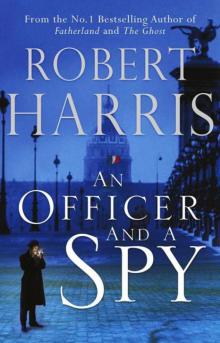 An Officer and a Spy
An Officer and a Spy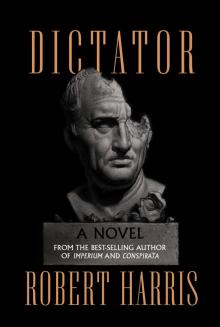 Dictator
Dictator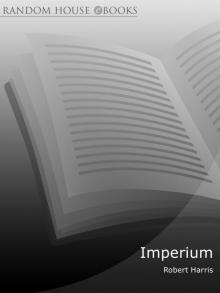 Imperium:
Imperium: Enigma
Enigma Fatherland
Fatherland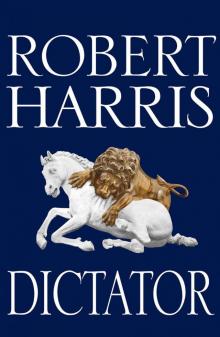 Dictator:
Dictator: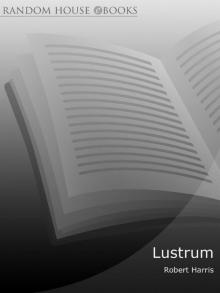 Lustrum
Lustrum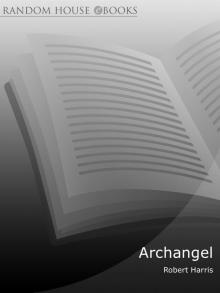 Archangel
Archangel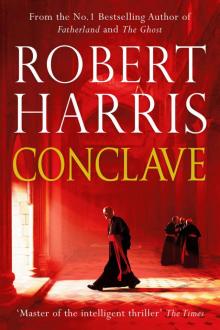 Conclave
Conclave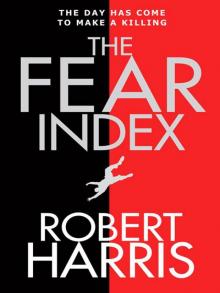 The Fear Index
The Fear Index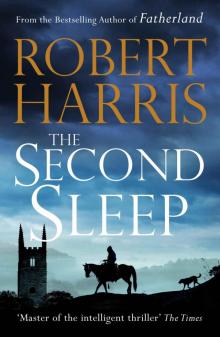 The Second Sleep
The Second Sleep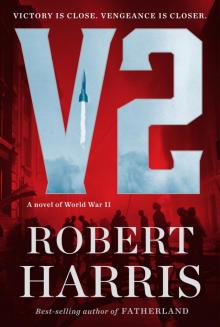 V2
V2 Lustrum c-2
Lustrum c-2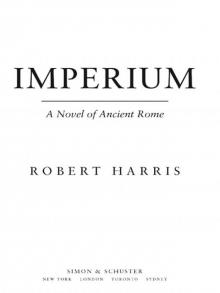 Imperium
Imperium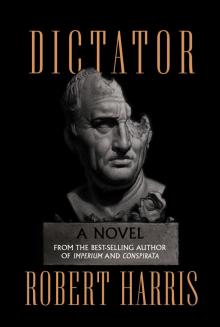 The Dictator
The Dictator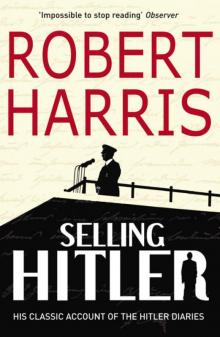 Selling Hitler
Selling Hitler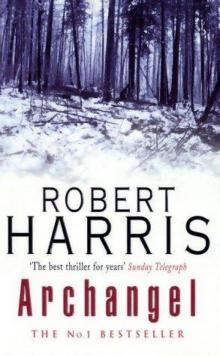 Archangel (Mass Market Paperback)
Archangel (Mass Market Paperback)